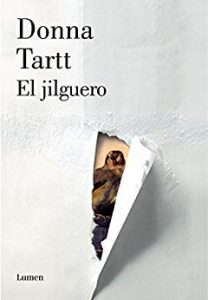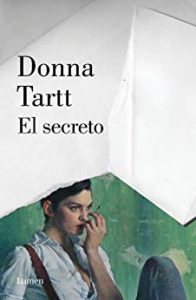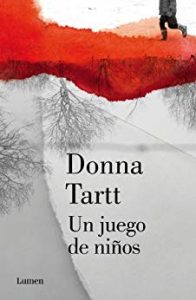If there is anyone who approaches the craft of writing with meticulous professionalism, it is Donna tartt. Since her beginnings in storytelling, Donna has stood out for her great quality that led her to Pulitzer Prize in 2014, but their stories need a decade of rest between one publication and another.
Thus, in the famous balance between inspiration and sweating towards the achievement of a work, which Edison set at 99% towards the more physiological side, Tartt fulfills the premise towards a precious literature in which nothing yields to improvisation or is carried away by precipitation.
In this creative modus operandi, Tartt seems to share approaches with a Jeffrey Eugenides which also makes his dedication to writing an activity freed from external impositions to end up writing both novels that will be classics of our XNUMXst century.
Be that as it may, from this prolonged wait one can deduce a taste for perfectionism and a confidence that the passing and the sediment of time enriches each of his novels.
It is in sight if we consider the almost perfect balance that his fiction books end up taking. Mysteries or directly black stories, but always loaded with something more, with transcendent elements in a critical aspect.
Without forgetting each and every one of the characters formed as a cast, made first-rate actors in their interventions, thanks to a perfect outline in their descriptions and interventions.
All this without forgetting an aspect that perhaps one might think that this author might suffer: naturalness. That necessary verisimilitude in everything that happens, in behaviors and dialogues.
So, given so much work highly valued by the author, it is not surprising that high cadence in her fiction publications. Because yes, in the meantime, Donna Tartt also writes other types of non-fiction books. that although they do not reach other markets with such fluency, they endow her with that quality of a great writer in all areas.
Top 3 recommended books by Donna Tartt
The goldfinch
Perhaps you think that to write novels with such a long term between one and another, Donna Tartt does not strive for grandiloquent titles. But it is already known that synthesis almost always ends up being a virtue.
In this latest novel by Donna we delve into one of those works that sound insurmountable. And knowing the author's efforts to improve it, it may take her a couple of decades to undertake the next one.
The most fascinating thing about this story is the onslaught of suspense and mystery from a practically existentialist point of view. Theo Decker's character lives his last days locked in a hotel room in Amsterdam, although he really lives in a past moment that repeats itself in his brain with no signs of a solution.
Chance or perhaps the conspiracy of fate, led him with his mother on an impromptu visit to the Metropolitan Museum that would change his life forever.
Whoever planted the bomb would not imagine that Theo, the boy, was casually visiting the facilities with his mother, or maybe everything was scripted. Among the vague gray memories of dust and rubble, the sinister chance ended up guiding him on a strange mission around a ring that another victim gave him.
What happens next is conjugated between the enigma of the ring and the path of perdition taken by a Theo who feels himself the victim of a macabre plan, of a sentence that prevents him from dying.
Unless it all ends up meaning something else. Because on so many subsequent occasions when he bordered on death, the bitter taste of mindless survival had come to rescue him for a strange mission.
El secreto
The dedication shows. There is no choice but to recognize it already in this first novel published in 1992, when Donna was not yet thirty years old. And precisely for this reason, given the theme it may sound like a youth story due to its location in a student environment, we end up discovering a black plot that touches many other social aspects.
The reading of this suspenseful plot becomes distressing in its double aspect of thriller and criticism of the elitist culture that seems to endow wealthy young people with a higher level. Everything takes place in a University of New England.
This is where Richard Papen goes, from the west coast of the country. Received reluctantly at first by a group of five friends, he finally joins in and shares his particular experiences with them. The kids are led by a literature teacher who makes them feel special, different, above many others.
Convinced by that vision of themselves and given over to alcohol and drugs, they end up walking the darkest paths of hedonism, nihilism and the strange instilled supremacism.
Until the shadows of their actions end up covering them with sinister prospects of a storm. The day in which they have to assume the consequences of their excessive acts, their great secret will end up marking their souls towards the most complete doom.
Child's play
Normality is a tablecloth on which the sins, guilt and secrets of every family are covered in a placid after-dinner.
That idea is what emerges in the case of a family like the Cleves. And torturing yourself doesn't make sense. When Robin passed away, a door was locked forever. That time was closed for the benefit of survival. But it is already known that children do not understand closed doors or secrets.
For Harriet her brother Robin is just a vague memory, a scent, a bond broken when she was just a baby. But at twelve years old, she is already beginning to understand the weight of her absence and for her, freed from any type of filter, it is essential to go to the other side of that door.
With 12 years everything is a game, even the exploration of the world in its blackest aspect. She insists on finding out more about what led to Robin's death, hanging from a tree.
The vision of the family that remains forced and unreal, in which each one endures their sorrows towards self-destruction by pretending that desktop normality fills the plot with sadness.
But Harriet's childhood is concerned with bringing the glow of childhood, the innocent intention to discover the truth. And who knows? Sometimes the vision of childhood can clarify many things that were overlooked at the time.



